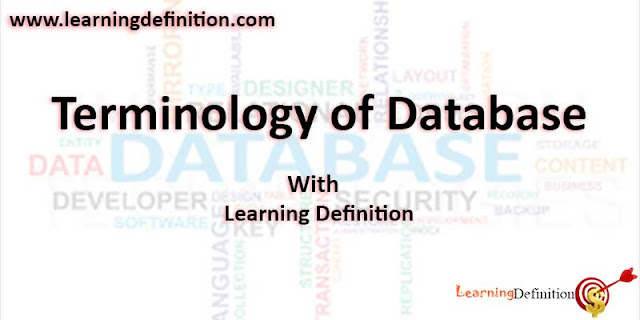 |
| Terminology of Database |
Table of Content
- ·
What is the difference between fixed-length and
variable-length fields?
- ·
What is table or relation?
- ·
Define Entity?
- ·
Define tuple?
- ·
What is an attribute?
- ·
How a relation is formed?
- ·
Write different properties of a relation.
- ·
What is view?
- ·
What is the purpose of using views?
- ·
What is Key?
- ·
Who is user or end-user?
- ·
Who is a data administrator?
- ·
Who is database administrator?
What is the
difference between fixed-length and variable-length fields?
A Field that has fixed size and its size cannot be change
when data assigned to it is called fixed-length field. A field whose size may
be changed by file management system at the time of data entry into it is
called variable-length field.
What is table or
relation?
A set of named columns and set of rows is called relation. A
relation is also called as table. The fields are written as columns of the
table. The data of different records is written under the columns of the table
Define Entity?
Anything in the real world that has a set of different
attributes or properties is known as entity
Define tuple?
Each row in a relation represents a single record. Each row
is also known s tuple or occurrence in that relation.
What is an attribute?
The name columns of the relation are called attribute in a
relation each attribute has a unique name.
How a relation is
formed?
The data about an entity is collected and stored in table or
relation of database. A relation is formed by converting the attributes of
entity into columns. The name of the entity is given as relation name.
Write different
properties of a relation.
The properties of a relation are as follow:
No Duplicate row exist
The order of rows is insignificant
The order of columns in insignificant
Columns / attribute are all elemental or atomic
What is view?
Presentation of data for users is known as data view. By
using this feature of BDMS, same data of database can be viewed in different
ways and formats. The data from several relations of database can retrieved and
presented to the user as one relation.
What is the purpose
of using views?
The purpose of using views is to hide the confidential data
of database from un-authorized and illegal user. Only the particular data of
database is presented to the users according to their specific needs.
Therefore, views provide a level of data security.
What is Key?
A key is an attribute or set of attributes of a relation.
Key are defined in the relations for the following purposes:
For uniquely identifying the records of relation
For establishing relationships between relations.
For quickly accessing particular records from the relation /
table.
For scoring records of a relation based on the data of one
or more columns.
Who is user or
end-user?
The users or end-users are the people who use the DBMS to
perform Different operation on database. The end users need not have complete
knowledge of computer system and databases. They can install new software and
operating systems into the computer.
Who is a data
administrator?
Data administrator is a person who is responsible for the
entire data resource of an organization. He develops functional requirements
for the database being used in te organization. The main job of data
administrator is to decide what data should be stored in the database. He/ She
also established policies for maintain data, once it has been stored. Usually,
Data Administrator is a manager of the organization and not an it professional.
Who is database
administrator?
The database administrator (DBA) plays very important role
in DBMS environment. The DBA is responsible for designing, coordinating and
monitoring the database system. The DBA is an it professional. He must be
technically competent having excellent communication and management skills

 Reviewed by JD Ahmad
on
June 12, 2018
Rating:
Reviewed by JD Ahmad
on
June 12, 2018
Rating:









No comments: